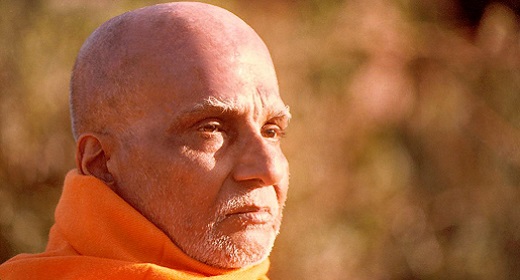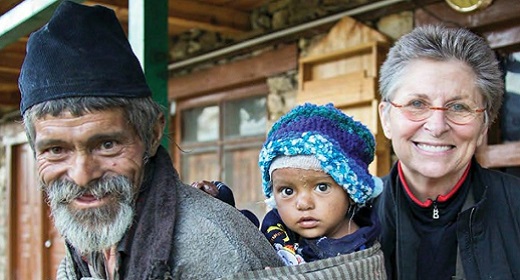by Swami Krishnananda: To the Officers of the Indian Administrative Services Academy in Mussoorie on May 10, 1978.)

First of all, I should express my thankfulness for being in the midst of an audience which, in my humble opinion, has been able to appreciate the higher values of life initiated by the practice of what we know as yoga physical exercises.
At the very outset, I would wish to point out that these exercises have a novelty of their own, a peculiarity which distinguishes them from ordinary games and sports. The term ‘yoga’ applied to a mere physical exercise indicates the deeper significance of these performances. Yoga is a Sanskrit word which literally means union, and by significance and import it means harmony and equilibrium of forces. Therefore, yoga is a system which introduces equilibrium, harmony and balance into the life forces.
While there are stages of the practice, and yoga is a gradational system of ascent from stage to stage until perfection is achieved, even the initial step or the first step is characterised by this tendency to equilibrium and harmony. The performance of the physical exercise is, therefore, an effort to introduce harmony into the system. I am advisedly using the word ‘system’ without using the word ‘body’ because we are a system or an organisation of a type of existence, and are not merely isolated, segregated entities wrongly designated as physical bodies.
The human system is a conglomeration of forces and, on the surface of it, what we call the physical body is merely a concretisation of certain forces which are culled from the vast reservoir of nature. The whole of nature is nothing but an ocean of force, and we are a part of nature, as it is very well known. The whole universe is nature, and we are not merely contents of nature, but participants in the workings of nature. We are not participants in the sense of a peon participating in the working of an office or a subordinate participating with the boss, but this participation of ours in the workings of nature is of an organic character.
We do not collaborate with nature as subordinates or working classes or labourers, but as inseparable organically related essential ingredients in the very composition of nature. Or, to make the point a little more clear, I may give you an example. The collaboration that we are expected to extend to nature for the purpose of introducing harmony into our lives is comparable to the harmony that is extended by the limbs of the body to the function of the whole physiological system. The finger of the hand is not a peon of the body. You cannot even call it a subordinate of the physiological system, notwithstanding the fact that it is a part belonging to the whole which is the body. There is an affinity which is not describable merely in arithmetical terms. This affiliation that obtains between the part and the whole in the human system can best be described or designated as organic, which means to say the parts cannot be separated from the whole without detriment to the whole. When the part of an organism is isolated from the whole, there is damage done to the whole as well as a deathblow given to the part.
Now you can understand what will happen to us if we do not appreciate our essential relevance to the structure of nature. The philosophy of yoga is the philosophy of the integration of natural forces. It is not a Hindu system or an Indian technology, but a universal science. Though the word yoga is derived from the Sanskrit language, its significance is universal, applicable to all humanity. We are human beings first, and perhaps last. We are nothing more, nothing less. We are not Indians or Europeans or Americans. We are not Hindus or Christians or Buddhists or Muslims. We are human beings, and all other types of nomenclature are merely foisted upon us by social circumstances but are not essential to our nature and structure.
If we look at a human being, we cannot know what he is except that he is a human being. He is a simple unit constituting a body we call humanity. Therefore, the signs of mankind should be a uniform subject applicable and necessary for the entire group we call humanity.
This system of yoga, therefore, envisages the indispensable obligation on the part of the human being in respect of nature as a whole. As every citizen in a country has an obligation towards the running of the whole nation, much more is the obligation that every one of us has to extend towards nature, merely for the reason that we cannot go out of nature, just as we cannot jump out of our own skins. Wherever we go we are in nature, within nature, a part of nature, breathing nature, living nature, and entering into nature even after the casting off of this physical body.
There is a series of transformations that we undergo in our lives, beginning with birth and ending with death, but all these transformations are various processes we undergo in our association with nature. Our problems, whatever be their nature, are mainly the outcome of our ignorant dissociation from the workings of nature. We have an egoism of our own. We assert ourselves. We assume an independence which does not really belong to us. This is our bane, our folly, and the primary ignorance is nothing but this peculiar kink in the brain of the human being which makes him self-confident in such an intensive manner that he thinks that nature is outside him and he is a subject envisaging nature as a kind of object external to him. This is untruth to the hilt. Nature is not an object before us. Not even the mountains, not even the sun and the moon and the stars can be regarded as external objects dissociated from our personality.
A great poet said that we cannot touch the petal of a flower in the cranny of a wall without disturbing a star in the heavens. Such is the organic connection between things. We may wonder what connection there can be between a creeper in a cranny of the wall in our house and the stars in the heavens, but there is such a connection, and much more is the connection we have with the whole cosmos. Our disorders in life – physical, vital, sensory, mental, intellectual, social, communal and political or international, whatever they be – are all attributable to a kind of dissociation that has unfortunately taken place between us and the natural structure.
Yoga tries to remedy this defect that has been ingrained into our personality right from our birth. We have been taught by our society, by our parents, by our educational institutions, by the circumstances in which we live, to assert ourselves as independent persons. ‘I’ is the word that we always use in respect of our own selves. Everyone is an ‘I’, so that there are many I’s, a multitude of I’s, apparently unconnected with each other.
The assertion of individuality is contrary to the aspiration for universal brotherhood and the solidarity of mankind. This is simple logic which anyone can understand. If each one of us is absolutely independent – if I have a status and ego of my own and am cut off from everyone, and my fortune is in my hands and what happens to me has no relevance to the lives of others – if this is the fact, then working for any kind of solidarity or unity or welfare of a vaster dimension would be a futile attempt.
But we know very well that we cannot live isolated lives. We feel like fish out of water if we are absolutely left alone in our rooms or in a prison, for instance. We like to be in society, to form a community of our own, and to belong to a larger whole. What is this tendency in us but an indication that basically we belong to a larger expanse of reality? It is not patent outside but it is latently present inside, and this latent reality in us speaks in a language of its own and tells us that we belong to a vaster dimension of reality, that we are citizens of a larger kingdom – a divine kingdom or a universal empire, whatever it be. That we belong to such a whole and we cannot close our eyes to this fact is indicated daily from moment to moment from the types of restlessness that we feel in our lives. The agony, the anguish, the unhappiness that we feel, whatever be the nature of this unhappiness, is nothing but an indication that we have committed the blunder or mistake of imagining that we are independent individuals isolated from the whole to which we really belong.
Now I will try to give an idea of what this whole is to which you belong. What is the meaning of whole? What is this whole, and where is it? The whole is again a gradational presentation. There are levels of wholes. Your personality itself is a completeness. You are a whole, and not a part. You feel a completeness in your physical body, notwithstanding that you have got isolated limbs – legs, fingers, toes, nose, eyes, ears, etc. The differences among the limbs of the body do not make any difference to the feeling of your wholeness of personality. I do not feel insecure because I have got ten fingers, one different from the other. I do not feel unhappy because of this distinction within my own self. This distinction is brought together into a single wholeness of consciousness in me, and I am a complete being. A child is a complete being, an adult is a complete being, and an old man is a complete being. This completeness is the individual completeness that we are living in, but this is not really complete from the point of view of a larger possibility. That we are individually not complete in spite of our physical wholeness is again indicated by our desire for relationships with people outside, the world, etc.
A family, for instance, is a larger whole than an individual. That is why people like to live a family life and feel very miserable if they are absolutely alone. But even a family is not a completeness because many families make a village or a community, many communities make a country or a state, and many states or countries make the whole world. You have a desire within you to extend the consciousness of your wholeness to greater and greater amplitude. This desire to become complete will never end because no matter how much you extend the horizon of your consciousness of wholeness there is a further vista before you which beckons you forward and tells you there is something beyond, so that no man, not even the king of the whole world, can be happy. A person who has conquered the whole earth has a desire to conquer the skies, and if he goes to the skies, he would like to go beyond the limits of the skies, and so on.
The reason behind all this is that you have an infinitude of substance within yourself. This infinitude is ultimately the wholeness that you are aspiring for even in the littlest deeds of your life. The perfection that you are seeking is nothing but a reflection, however small the degree be, of its reflection, of the infinitude that is your capacity. You cannot rest in peace until you reach this completeness.
The yoga exercises, therefore, begin or initiate the system of introducing this association of your individuality with the immediately possible higher wholeness which is visible to your consciousness. You cannot suddenly jump to the Infinite that is the ultimate. You have to go step by step, as you climb a ladder by rungs. The immediately transcendent wholeness is your objective in the initial stage. The various stages of yoga begin with yoga asanas, pranayama, the control of the senses, the stability of the mind, concentration of the intellect, and harmonisation of the spirit. All these are interrelated, blended one with the other. You know very well that you are not merely a body because you have within yourself many other faculties other than the body. You have got sense organs, vital breath, a mind, an intellect, and much more than all these, you have an integrating consciousness within yourself, on account of which you feel that you are a single whole.
Every yoga exercise is so constituted and arranged that the various positions bear some connection to the various parts in the body which have an internal relationship with the forces of nature outside. So these exercises are not merely a hodgepodge. They are not just random imaginary poses which someone has thought of. They are highly scientific presentations, not merely anatomical and physiological in their significance, but even psychological and super-physical. Their super-physical significance is the cause or reason behind the harmony that one feels after the performance of these exercises. The happiness, the sense of relief and the lightness of body that we feel after the performance of these exercises is because of the internal harmony that we unconsciously establish between ourselves and nature.
It should be clear that these yoga exercises are not merely games. They are not like football, tennis, etc. They are scientific systems of the arrangement of the bodily parts by which we introduce a harmony between ourselves and the environment of nature outside. Natural forces flow into us. We become weak, we feel helpless and grieved merely because natural forces have been cut off from us on account of the assertion of our ego or individuality. Just as when we close all the doors and windows of our house sunlight cannot enter and we are completely deprived of the solar energy that would have otherwise energised us if we had been basking in the sun, so also do we close the psychological doors and windows completely by the assertion of individuality, due to which the natural forces which would have otherwise entered into us are blocked. The more we are egoistic and individualised, the greater is our weakness, but we feel it is the other way around. An egoistic person thinks that he is very proud and strong, but it is a foolish attitude. The greater the ego, the weaker is the person. The lesser the ego, the greater and the more capable is the individual because of his association with nature. Nature itself will help this person by blowing the wind of energy from the reservoir outside into the system. It is like opening all the windows in the house. Immediately the air blows inside. We need not invite the wind to come inside; we just open the windows and nature automatically enters.
Inasmuch as we are integrally related to the whole of nature, there is no need of extending any invitation to nature. Nature is our mother. She loves us much more than we love her. But if we turn our nose up to her and act as if we are independent, then nature is helpless.
Physical weakness and debilities of various types, including psychological and social, are primarily the consequence of our ignorance of the laws operating in the universe. Our education is a husk, really speaking. We learn the technologies of life that are immediately present before us, but we are completely oblivious of the higher controlling powers. Our life is controlled by the law of nature; we may call it the law of God. The whole system of the Absolute is operating everywhere, in every nook and corner of the world, like the law of the government that is invisibly present everywhere, even inside this hall, though it is not visible to the eyes. Natural forces, natural laws inexorably work everywhere, in every atom in space, and we are not exempted from the operation of this law. So from where comes the question of independence?
Thus yoga, while it prescribes physical exercises as a necessity and an initial step in the attempt at an introduction of harmony into the system, also warns us that this is not all, because we are not merely the body. If our mind is disturbed and agonised, if the emotions are boiling, then yoga, physical exercises, will do no good. This shows the interconnection between mind and body.
We are a psychophysical organism, not merely a physical body. If the mind is completely out of tune with the body, the physical exercises will not do much good. We know what effect the mind has on the body. A bolt from the blue which falls from above on the mind can simply disrupt the system of the whole body. Shocking news, for instance, can make the heart stop in one second. This is the effect the mind has upon the body, and vice versa; bodily arrangements affect the mind, and mental disorders also affect the body.
Hence, yoga physical exercises are not merely physical. This is a note of caution given to the participants of the yoga physical exercises. Your mind should also be free from all tension. Yoga is a system of introducing freedom from tension of every kind, and ‘every kind’ is to be underlined. As tension is an unhealthy trend and disease of the system, it has to be cautiously avoided. You first have to be happy in your mind because an unhappy mind cannot derive much benefit merely by physical exercises. If you are grieving inside, crying and cannot sleep happily even one night, what is the use of physical exercises?
So you have to take yourself as a completeness, again to emphasise. You are complete in the sense that you are a body, you are a mind, and you are spirit. You cannot isolate one from the other. You are a total being, and in the capacity as spirit you belong to the Supreme Absolute. As spirit you are associated with the Almighty Himself, as a mind you are an eddy in the ocean of the cosmic mind, and as a body you are again a part of the universal forces.
Many of you may be students of modern physical science, and you are certainly acquainted with the great discoveries which tell us that even physically speaking we cannot be isolated from this world. The so-called rivers and mountains and sun and moon and stars are visible forms of apparent isolations of eddies of universal force, but at the bottom they are united one with the other. For instance, we are inwardly connected with the sun.
Thus, physically, psychologically and spiritually we are one with the whole creation, what to speak of social association or political relationship. We are certainly one. Ultimately, unity is operating everywhere, in all levels of life and in every act of our existence. This principle of unity which is present basically in life is the guiding constitution behind the practice of yoga, whether it is physical exercise, mental concentration or the higher meditation.
So here you have got a very encouraging and enthusing philosophy of life in the system of the practice of yoga. It makes you not merely a healthy person physically with a sane mind, an acute intellect and an amiable person in society, a very able administrator, but also a child of God. All these things you achieve at one and the same time. This is the miracle that yoga works in life.
Hence it is that yoga physical exercises have a differentia of their own which distinguish them from the Western type of physical exercises which merely tone the muscular system in an extrovert manner but do not bring about a unity and harmony in your system. You feel exhausted after the performance of an ordinary Western type of physical exercise. Your heart starts jumping and beating hard. You cannot even speak. But after the yoga physical exercise you feel relaxed, you feel energised, you feel happy, you feel that you can do more work. This is the distinction that can be drawn between the yoga physical exercises and the ordinary exercises that we know as games and sports.
Yoga is, therefore, not merely a system of physical living, but it is also a great psychology of human nature. It is a tremendous system of social organisation and political administration, and it is ultimately the great art of being truly happy in life. What is the use of achieving anything if you are not happy? And what is it that you are aiming at in life except happiness and perfection and intensity in the achievement of your happiness? You ask for an increase in the quantity as well as the quality of the happiness that you are seeking. You want a large amount of happiness, not merely a drop of it, and you also want a qualitatively high order of happiness, not merely a fool’s happiness or a pig’s happiness. This shows that happiness is the ultimate goal of every adventure in life. The security that you require and the organisation that you set up, the works that you do, all the ventures in life are aimed at perfection that you call intensity of happiness both quantitatively and qualitatively. This cannot be achieved as long as you are imperfect in your life, and perfection is nothing but harmony of your total life with the total life of the universe.
This is a great enlightenment, a great light that is thrown upon us by the philosophy and the practice of yoga which is a universal science, as I mentioned, which has no distinction of class, creed, cult, nationality, etc. It is the science of the universe, and whoever has been able to understand the meaning of this great science of life and has succeeded in the practice of this science in one’s own day-to-day existence would certainly be a blessed person.
With these few words I invoke the grace of the Almighty upon you all that you succeed in all your adventures and enterprises, and be examples to the whole nation, nay, to the whole world. God bless you.









































